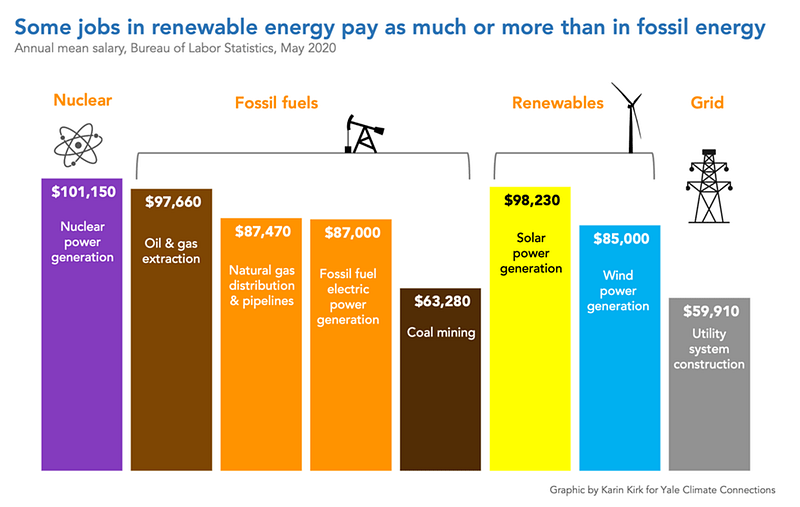With constant innovation and advances, a dynamic sector like renewable energy can sometimes be difficult to pin down. Small-scale assumptions don’t necessarily apply to what is now big business with a corresponding diversity of opportunities. How accurate are your expectations? Time to find out.
 The renewables job market extends far beyond manufacture and installation
The renewables job market extends far beyond manufacture and installation
1. It’s all engineering, manufacturing and installation
One of the most common assumptions made about jobs in renewable energy is that they are exclusively in the domain of manufacturing and installation. While there are plenty of roles available for those pursuing a career in electrical engineering, the sector is much more varied than it may seem. All the departments common to big business in other industries apply here too, so whether it's sales, project management, IT, finance, legal or HR, there’s a whole range of job prospects.
Beyond that, a background web of cascading job opportunities underpin the renewable sector. For example, ecologists monitor and mitigate the impacts of wind turbines on local wildlife, analysts evaluate wind data and site feasibility, while landscapers design and maintain the wider site around renewable energy assets.
Elsewhere, green building architects incorporate renewable energy sources within commercial development, software developers optimise renewable energy systems and community liaisons ensure renewable projects address local needs and concerns. Creatives, too, are required to communicate, engage and educate the public about renewable energy technologies and initiatives. There’s substantial scope and depth to the renewables workforce, aside from those imagined in construction and implementation.
 Renewable energy is based on natural forces present all around us
Renewable energy is based on natural forces present all around us
2. Location, location, location
The renewables industry currently centres around a few key locations globally, namely China, North America, Western and Northern Europe, Brazil, India and Australia. These places have invested significant resources into development of renewables from an early stage and, as a result, they do have a higher concentration of renewable energy companies and associated job opportunities.
That said, the very nature of renewable energy involves harnessing meteorological and topographic conditions that exist worldwide without adhering to the abstract boundaries of countries or states. As such, there is a wealth of potential for renewable energy jobs wherever favourable climatic conditions prevail, be that in sunshine or wind, along coastlines or by large rivers. It follows that many renewable energy startups and regional branches of established companies are present outside of the core areas mentioned above.
Furthermore, many roles, particularly desk jobs such as design, administration or project management, aren’t physically on-site, but rather in an office or are increasingly offered as remote positions as in other sectors.
 Active interest in sustainability - common but not essential
Active interest in sustainability - common but not essential
3. Passion project
Smaller businesses and industries are often powered by a pioneering workforce that are passionate about their core product or outcome. Many people working in renewables do have an active interest in sustainability, however, renewable energy can no longer be dismissed as a sector reserved for environmentalists.
As a global industry with growing capital and wide-ranging requirements, a variety of skill-sets and perspectives are being sought out and valued. Being passionate about the environment is not a prerequisite to work in renewables. In fact, the alignment of skills between energy sectors makes jobs in renewables a prime opportunity for those currently working in fossil fuels to transfer away from job uncertainty in the long-term to a sector growing in scope.
With both global and local policies increasingly calling for reductions in fossil fuel use, the balance of job stability and progression is tipping in favour of renewables. Plus, it is a much more culturally diverse and inclusive industry compared to traditional energy sectors that have been dominated by white patriarchy.
 Permanent, well-paid roles are the mainstay in the renewables sector
Permanent, well-paid roles are the mainstay in the renewables sector
4. Limited prospects and security
A narrow view of renewable energy jobs may translate to an assumption that most roles are temporary or contract-based, which can be the case for project-based roles like installation. Yet the vast majority of jobs - some 90% of those listed on Rejobs - are full-time, permanent positions with all the security that entails.
Emerging and experimental industries often don’t have the financial clout or capital to offer substantial salaries, so some may expect that renewables jobs don’t compare to the pay offered by Big Oil or traditional energy sectors. While fossil fuel extraction is highly paid (Energy workers are paid 34% more than the median U.S. wage, according to the 2020 U.S. Energy and Employment wage report), parity in pay is emerging between fossil fuel and renewable energy roles across manufacturing, construction, trade, professional services, and maintenance. Plus, jobs in renewables often provide more job security and opportunities for growth.

Annual mean salary, Bureau of US Labor Statistics (Graphics by Karin Kirk, Yale Climate Connections)
5. Economic viability is reliant on subsidies
In the past decade, the cost of renewable technologies has decreased dramatically. Between 2010 and 2021, the cost of utility-scale solar dropped 5 fold to become the cheapest form of new electricity generation in large parts of the world, including Latin America and Southern Europe, even taking into account fossil fuel subsidies for coal, gas and oil.
Fossil fuel companies have historically received substantial subsidies much greater than those in renewables, from direct funding to tax breaks and indirect assistance in mitigating its environmental damage. But, international agreements, advances in renewables technologies and policies informed by increased environmental and health awareness are influencing a global shift towards reducing these subsidies and increasing financial support for renewable energy.
The pace of this shift varies by region and is influenced by complex economic, political, and social factors, but it is gathering momentum.
Green Growth
Renewable energy is far from a small sector comprised of green activists. It is a large and expanding industry of diverse job roles, mostly permanent and well-paid. Uneven geographic distribution doesn’t necessarily dictate where jobs exist and the market’s success isn’t dependent on subsidies. Rather, careers in renewables offer enhanced job security and stability with an unrivalled opportunity for growth and progression as the sector continues to deepen and develop.
Article by Lauren Holford
Published on January 22, 2024
Share this article with your folks, and help them find a career to be proud of.



